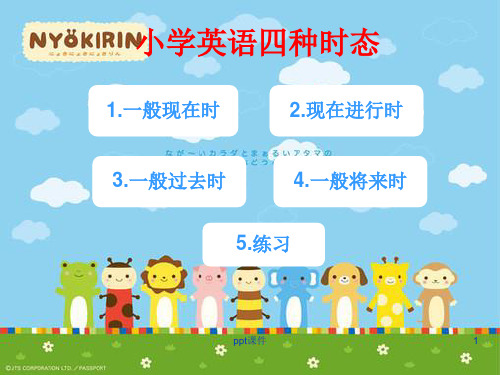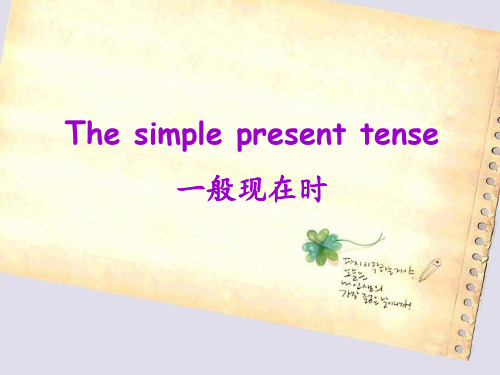小学一般现在时练习课件
合集下载
英语语法专项复习一般现在时教学课件2

For example
She gets up early every morning.
她每天早上早起。
I go to see my grandmother every month.
我每个月都去看我的奶奶。
01 概念与用法
一般现在时的构成结构
Be动词
动词原形
动词三单
01 概念与用法
Be动词的一般现在时的构成
如:guess-guesses wash-washes
watch-watches go-goes do-does 3.以“辅音字母+y”结尾,变y为i, 再加-es:
如:study-studies fly-flies
练习:
一、 写出下列动词的第三人称单数 (2分)
drink __d_r_in_k__s_ go __g_o_e_s_
Part. two
动词变化规则
02 动词变化规则
肯定句结构
1、I play football every day . 2、My friends play football every day . 3、He plays football every day . 4、Tom plays football every day .
肯定变否定,be后加not
01 概念与用法
一般疑问句结构变化
Are you a good person? Is she/he a good person.
肯定句变一般疑问句,只需将 be动词提前
行为动词 的一般现在时是怎么构成的呢?
01 概念与用法
观察下列句子
1、I play football every day . 2、You play football every day . 3、My friends play football every day . 4、He plays football every day . 5、Tom plays football every day . 6、My brother plays football every day .
小学英语四种时态 ppt课件

ppt课件 4
3. 一般疑问句 (1)Am / Is / Are+主语+表语+? Is your mother a nurse? 你妈妈是护士吗? Is Polly a bird? 波利是鸟吗? (2)Do+主语+动词原形+其它+? Do you like learning English? 你喜欢学习英语吗? Does your father go to work every day? ppt课件 你爸爸每天都上班吗?
5
4. 特殊疑问句
特殊疑问词+一般疑问句+? What is your father? 你爸爸是干什么的? What do you do every day? 你每天做些什么? When does your mother go to work every day? 你妈妈每天什么时候去上班?
ppt课件 6
13
1.The twins are ___________(wash) the washing clothes now. 2.Look! He is ________ playing(play) basketball over there. 3.Listen! ______ Sally _______(sing)? singing Is 4.What _____(be) you doing (do) are now.
注意,以下情况要使用一般现在时:
• 表示特征、性格和能力。如: Lifeng is a tall boy. 李锋是一个高个子男孩。 That's a big tree. 那是一棵大树。 My skirt is very new. 我的裙子很新。 She can speak English. 她会说英语。 2. 表示经常发生的或习惯性的动作。如: I get up at seven every day. 我每天7点起床。 Classes begin are seven days in a week. 一周有七天。 The earth goes around the ppt sun. 课件 地球绕着太阳转。
3. 一般疑问句 (1)Am / Is / Are+主语+表语+? Is your mother a nurse? 你妈妈是护士吗? Is Polly a bird? 波利是鸟吗? (2)Do+主语+动词原形+其它+? Do you like learning English? 你喜欢学习英语吗? Does your father go to work every day? ppt课件 你爸爸每天都上班吗?
5
4. 特殊疑问句
特殊疑问词+一般疑问句+? What is your father? 你爸爸是干什么的? What do you do every day? 你每天做些什么? When does your mother go to work every day? 你妈妈每天什么时候去上班?
ppt课件 6
13
1.The twins are ___________(wash) the washing clothes now. 2.Look! He is ________ playing(play) basketball over there. 3.Listen! ______ Sally _______(sing)? singing Is 4.What _____(be) you doing (do) are now.
注意,以下情况要使用一般现在时:
• 表示特征、性格和能力。如: Lifeng is a tall boy. 李锋是一个高个子男孩。 That's a big tree. 那是一棵大树。 My skirt is very new. 我的裙子很新。 She can speak English. 她会说英语。 2. 表示经常发生的或习惯性的动作。如: I get up at seven every day. 我每天7点起床。 Classes begin are seven days in a week. 一周有七天。 The earth goes around the ppt sun. 课件 地球绕着太阳转。
一般现在时态练习PPT课件

Friday afternoon. 否I u定su句a:lly don’t play football on Friday 一般疑问句:
Do you usually play football on ..?
W划h线at提d问o you usually do on Friday afte
2020年10月2日
(mend) his bike.
2020年10月2日
12
4. Where _d_o_e__s_ their father_w_o__rk__
(work)? He _w_o_r_k_s_ (work) on a
farm.
isn’t working
Байду номын сангаас
But now he ______ (not work). He
12.020t年e10a月2c日hes, is, talks, talking, is talkin11g
2. Listen! Whoi_s_r_e_a_d_in(gread)
English? Han Meimei is. She
often r_e_a_d_s__(read) English in
10. What time _d_o_e_s__ his mother _d_o___(do) the housework?
2020年10月2日
4
改句子
1. Do you often play football after school? (肯定回答)
Yes, I do. 2. I have many books. (改为否定 句)
I don’t have many books.
3. Gao Shan’s sister likes playing tabGleaoteSnhnaisn’(s 改sis为te否r d定o句es)n’t like
Do you usually play football on ..?
W划h线at提d问o you usually do on Friday afte
2020年10月2日
(mend) his bike.
2020年10月2日
12
4. Where _d_o_e__s_ their father_w_o__rk__
(work)? He _w_o_r_k_s_ (work) on a
farm.
isn’t working
Байду номын сангаас
But now he ______ (not work). He
12.020t年e10a月2c日hes, is, talks, talking, is talkin11g
2. Listen! Whoi_s_r_e_a_d_in(gread)
English? Han Meimei is. She
often r_e_a_d_s__(read) English in
10. What time _d_o_e_s__ his mother _d_o___(do) the housework?
2020年10月2日
4
改句子
1. Do you often play football after school? (肯定回答)
Yes, I do. 2. I have many books. (改为否定 句)
I don’t have many books.
3. Gao Shan’s sister likes playing tabGleaoteSnhnaisn’(s 改sis为te否r d定o句es)n’t like
《一般现在时讲解》课件

一般现在时可以用来描述当前的情况或状态,例如“我现在很开心”、“她现在 是一名学生”等。这种时态强调的是当前的情况或状态,而不是过去或未来的变 化。
表示客观事实或普遍真理
总结词
描述不受时间影响的客观事实或普遍真理。
详细描述
一般现在时可以用来描述不受时间影响的客观事实或普遍真理,例如“地球是圆的”、“水在100摄氏度下沸腾 ”等。这种时态强调的是事实的普遍性和客观性,不会因为时间而改变。
I eat an apple every day. (我每天吃 一个苹果。)
结构
一般现在时的基本结构是“主语+谓 语+(宾语)+(其他成分)”,其中 谓语动词以原形或第三人称单数形式 出现。
一般现在时的特点
01
02
03
强调现在
一般现在时强调当前时间 点,表示动作或状态正在 发生或存在。
普遍性
一般现在时用于描述普遍 存在的真理、事实或习惯 性行为,不受时间限制。
总结词
动词形式不同
详细描述
一般现在时的动词形式为原型,而一般将 来时的动词形式需要用will+动词原型。
与现在进行时的对比
总结词
动作状态不同
详细描述
一般现在时表示现在的动作或状态,强调动作的持续性 ;而现在进行时表示正在进行的动作或状态,强调动作 的进行过程。
总结词
用法侧重不同
详细描述
一般现在时更侧重于描述习惯性、经常性的动作或状态 ,而现在进行时则侧重于描述当前正在发生的动作或状 态。
一般现在时的用法
表示习惯性或经常发生的动作
总结词
描述日常生活中的常见行为或习惯。
详细描述
一般现在时用于描述日常生活中的常见行为或习惯,例如“我每天早上起床” 、“他每周去健身房锻炼”等。这种时态强调行为的频繁性或习惯性,而不是 特定的一次性事件。
表示客观事实或普遍真理
总结词
描述不受时间影响的客观事实或普遍真理。
详细描述
一般现在时可以用来描述不受时间影响的客观事实或普遍真理,例如“地球是圆的”、“水在100摄氏度下沸腾 ”等。这种时态强调的是事实的普遍性和客观性,不会因为时间而改变。
I eat an apple every day. (我每天吃 一个苹果。)
结构
一般现在时的基本结构是“主语+谓 语+(宾语)+(其他成分)”,其中 谓语动词以原形或第三人称单数形式 出现。
一般现在时的特点
01
02
03
强调现在
一般现在时强调当前时间 点,表示动作或状态正在 发生或存在。
普遍性
一般现在时用于描述普遍 存在的真理、事实或习惯 性行为,不受时间限制。
总结词
动词形式不同
详细描述
一般现在时的动词形式为原型,而一般将 来时的动词形式需要用will+动词原型。
与现在进行时的对比
总结词
动作状态不同
详细描述
一般现在时表示现在的动作或状态,强调动作的持续性 ;而现在进行时表示正在进行的动作或状态,强调动作 的进行过程。
总结词
用法侧重不同
详细描述
一般现在时更侧重于描述习惯性、经常性的动作或状态 ,而现在进行时则侧重于描述当前正在发生的动作或状 态。
一般现在时的用法
表示习惯性或经常发生的动作
总结词
描述日常生活中的常见行为或习惯。
详细描述
一般现在时用于描述日常生活中的常见行为或习惯,例如“我每天早上起床” 、“他每周去健身房锻炼”等。这种时态强调行为的频繁性或习惯性,而不是 特定的一次性事件。
小学英语一般现在时 第三人称单数 动词三单变化规则课件ppt

动词的三单变化
1、She studies English well. 2、Mike flies a kite. 3、Lucy play games every day. 4、The girl carries the box.
动词的三单变化 4、特殊变化
have — has go — goes do — does
单项选择
1.Ben_____a new bicycle. A.have B.has C.are D.were 2.Kitty_____her bicycle to the park. A.ride B.riding C.rides D.ridden 3.A man _____in front of his car. A.walk B.walks C.walking D.work 4.Sam’s bicycle ______a bell. A.have B has C.having D.is having 5.The girl _______ “Excuse me” A.say B.saying C.says D.sayes
单项选择
6.Mike______not like his bike. A.do B.is C.does D.are 7.He ______apples. A.likes B.like C.does D.are 8.He_______with his nose. A.smelling B.smells C.smell D.is smell 9.Lucy_______with her hands. A.touch B.touching C.touches D.touchs
studies finishes has lunch runs buys
综合练习
小学英语一般现在时PPT课件

例如
2021
24
一般现在时 (一般疑问句)
He is a student. You are a boy.
Is he a student? Are you a boy?
I can swim.
I am a teacher.
Can you swim? Am I a teacher?
2021
25
变一般疑问句
Lily often writes to her uncle in the U.S.A. Does Lily often write to her uncle in the
U.S.A?
2021
32
变一般疑问句
We have lunch at 12:00. Do you have lunch at 12:00?
2021
21
变否定句
I want a banana. I don’t want a banana.
2021
22
变否定句
She speaks English well. She doesn’t speak English well.
2021
23
一般现在时 (疑问句)
句中有be动词或情态动词时,be 动词或情态动词can提前,首字母变 为大写;some 变any
状态:how 年龄:how old
价钱:how much 数量:how many
2021
36
特殊疑问句
有be动词或情态动词 构成:疑问词+be动 词或情态动词+主语+ 其它 例如
2021
37
特殊疑问句
She can speak English.
What can she speak?
《一般现在时》课件
主语 + 现在时动词(第三人称单数加-s)
主语 + do not/does not + 现在时动词
3 疑问句
Do/Does + 主语 + 现在时动词?
一般现在时的用法
1
描述现在经常发生的动作
2
She always drinks coffee in the morning.
3
描述习惯或常规
4
I usually go to bed at 10 o'clock.
描述现在正在进行的动作
I am studying English.
描述客观事实或真理
The sun rises in the e词需要加-s,例如:He studies Eng lish.
否定句和疑问句的构成
否定句和疑问句需使用助动词do/does,并把其 放在主语之前,例如:I don't like coffee. Does she like tea?
《一般现在时》PPT课件
一般现在时是描述现在正在进行或经常发生的动作的时态,也常用于表示客 观事实、真理和习惯。
什么是一般现在时
简称现在时
用于描述当前正在进行或经常发生的动作。
描述客观事实、真理、习惯等
一般现在时也常用于描述客观存在的事实、普遍的真理和个人的习惯。
一般现在时的构成
1 肯定句
2 否定句
小学英语一般现在时和一般过去时句型课件课件
主语是第一,二人称及第三人称复数 (否定句)
I do not go to work by bus • I did not go to work by bus
everyday.
yesterday.
you do not watch TV everynight.
You did not watch TV last
10.When ________ you _________(write) this song? I __________(write) it last year.
现在学习的是第10页,共11页
现在学习的是第11页,共11页
关于小学英语一般现 在时和一般过去时句
型课件
现在学习的是第1页,共11页
含有BE动词的句型
• 一般现在时表示某人某物现在的状态,
性质等.eg: •
I am a teacher now.
一般过去时表示过去时间内某人某物存在 的状态,性质等.eg:
I was a teacher last
year.
She(He) is a singer. We They are happy. You
4.You ___ (be)a lovely girl.
5.They ___(be) my parents. 6.They __________ (be) farmers two years ago.
7.Mike __________ (be) a baby long long ago.
8.We __________ (be) at home last night.
You watch TV everynight.
yesterday.
You watched TV last night.
小学英语时态语法:现在进行时、一般现在时时态讲解PPT课件
is jumping
monkey ______ ______ up and down.
Homework: Finish the exercise6.
谢谢大家!
home. 4. What time __do_e_s__ the shop _c_lo_se___ (close)? It _c_lo_se_s_ (close)
at nine o'clock in the evening.
5.Miss Guo __tea_c_he_s_ (teach) us Chinese this term. She ___is___ (be) a very good teacher. She often __ta_lk_s __ (talk) with us after class. Many of us like __ta_lk_in_g _ (talk) with her. Now, she _i_s _ta_lki_ng_ (talk) with Lily.
小学英语时态语法:现在进行时、 一般现在时时态讲解PPT课件
一、现在进行时的定义:表示现在正在进行或发生的动
作 。(句中一般含有now, 单独的look或 listen出现
在句首.)
二、它的结构:be + 动词ing 形式
三、动词加ing的变化规则 1.一般情况下,直接加ing,如:cook-cooking 2.以不发音的e结尾,去e加ing,如:make-making,
改句子 1. Do you often play football after school? (肯定回答)
Yes, we do.
2. I have some books. (改为否定句) I _d_o_n_’t _h_a_v_e_ _a_n_y___ books.
monkey ______ ______ up and down.
Homework: Finish the exercise6.
谢谢大家!
home. 4. What time __do_e_s__ the shop _c_lo_se___ (close)? It _c_lo_se_s_ (close)
at nine o'clock in the evening.
5.Miss Guo __tea_c_he_s_ (teach) us Chinese this term. She ___is___ (be) a very good teacher. She often __ta_lk_s __ (talk) with us after class. Many of us like __ta_lk_in_g _ (talk) with her. Now, she _i_s _ta_lki_ng_ (talk) with Lily.
小学英语时态语法:现在进行时、 一般现在时时态讲解PPT课件
一、现在进行时的定义:表示现在正在进行或发生的动
作 。(句中一般含有now, 单独的look或 listen出现
在句首.)
二、它的结构:be + 动词ing 形式
三、动词加ing的变化规则 1.一般情况下,直接加ing,如:cook-cooking 2.以不发音的e结尾,去e加ing,如:make-making,
改句子 1. Do you often play football after school? (肯定回答)
Yes, we do.
2. I have some books. (改为否定句) I _d_o_n_’t _h_a_v_e_ _a_n_y___ books.
五年级公开课小学一般现在时 -完整版PPT课件
Lily doesn’t go to work by bus.
A.用词的适当形式填空,并将句子改成否定句。
1. Kate comes (come) from Canada. 否:Kate doesn’t come from Canada. 2. I have (have) susic. 否:He don’t have the music.
The Simple Present Tense
一般现在时
warm—up:
What does he often do on the weekend?
What does she often do on the weekend?
He often does homework on the weekend.
句型
do not=don’t
does not=doesn’t
• 否定句: 行为动词:主语+助动词(do/does)+not+v.原形+其他.
I read books on Tuesdays 否:I don’t read books on Tuesdays. She has lunch at twelve. 否:She doesn’t have lunch at tHweelwvea.shes his clothes on the weekend.
过去
现在
将来
思维导图
一般现在时
用12..表 表法示示事经物常或性人、物习的惯特性征的、动状作态。。 3.表示客观真理或不可变更的事实。
He is a student.
I go to school The earth goes
every day.
around the sun.
A.用词的适当形式填空,并将句子改成否定句。
1. Kate comes (come) from Canada. 否:Kate doesn’t come from Canada. 2. I have (have) susic. 否:He don’t have the music.
The Simple Present Tense
一般现在时
warm—up:
What does he often do on the weekend?
What does she often do on the weekend?
He often does homework on the weekend.
句型
do not=don’t
does not=doesn’t
• 否定句: 行为动词:主语+助动词(do/does)+not+v.原形+其他.
I read books on Tuesdays 否:I don’t read books on Tuesdays. She has lunch at twelve. 否:She doesn’t have lunch at tHweelwvea.shes his clothes on the weekend.
过去
现在
将来
思维导图
一般现在时
用12..表 表法示示事经物常或性人、物习的惯特性征的、动状作态。。 3.表示客观真理或不可变更的事实。
He is a student.
I go to school The earth goes
every day.
around the sun.
